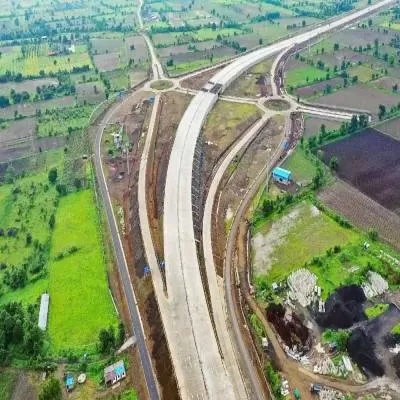- Home
- Infrastructure Transport
- ROADS & HIGHWAYS
- Silos in store

Silos in store
Although the Indian Government buys grains from farmers in bulk, it lacks the space to store it. Against this backdrop, the Food Corporation of India (FCI) has started the process of tendering for the construction of silos of 1.75-million-tonne storage capacity across the country.
Next step
The construction of these silos will be through national and international competitive bidding, winners of which will need to supply the technical aspects through Public-Private-Partnership (PPP) either on a Build-Own-Operate-Transfer, Build-Own-Lease-Transfer or Design-Build-Finance-Own-Operate basis. RN Bhargava, Advisor, FCI, affirms, "We are planning to build galvanised steel silos at 42 locations, each with a capacity of 50,000 metric tonne in two years, tenders for which (log on to www.fciweb.nic.in/tenders/tender_details) have already been floated."
The staggering shortage of storage facilities has prompted the need for the construction of such large-scale facilities. There are two types of silos - flat bottom and hopper bottom. To reduce grain losses due to bad weather and pest infestation, construction of steel silos is the key. The material used for the construction of these silos is galvanised iron with a grade of Z700. These are galvanised with a zinc coating of 350 gm per m. However, for smaller capacity, carbonised steel or stainless steel 304 can also be used to fabricate the storage system. Prasad S Kamathe, Business Head-Sales and Marketing, P Square Technologies, manufacturer of steel silos in the country, states, "Galvanisation is the process where zinc is spread over steel. As zinc is resistant to weather changes, the process prevents the grains from rotting over a long period of time."
Getting it right
The silos are manufactured as per the approved design which varies for different locations in the country. For example, a silo with a capacity of 10,000 tonne in Punjab will have a different design specification from the one in Chennai. Kamathe states, "The construction and manufacturing of the silos depend on the seismic activity in the zone." Moreover, wind speed of the location needs to be considered in its production and construction.
"The highest wind speed recorded over the last five years needs to be factored in. The thickness of the silos will also vary accordingly, adds Kamathe."
Once transported to the site, these silos are assembled as per the design. Kamathe explains, "The roof of the silo is installed first, followed by the positioning of different rings. Step by step a ring is placed over another. As the number of rings increases, so does the height of the roof."
Requirements at a silo complex
- Long term storage silos
- Truck parking area
- Lorry weighbridge
- Laboratory for quality testing
- Grain intake system
- Pre-storage silos
- Process tower
- Bulk truck
- Loading system
- Bagging system
- Rake bulk loading system
- Bulk rake unloading system
- Bag storage warehouse
- Rail siding
- Fumigation system
Source: Food Corporation of India
To share your views on this report, write in at feedback@ASAPPmedia.com
As the need for effective storage of food grains rises in the country, MONISHA RAO reports on the construction and manufacturing aspects of steel silos meant for storage. Although the Indian Government buys grains from farmers in bulk, it lacks the space to store it. Against this backdrop, the Food Corporation of India (FCI) has started the process of tendering for the construction of silos of 1.75-million-tonne storage capacity across the country. Next step The construction of these silos will be through national and international competitive bidding, winners of which will need to supply the technical aspects through Public-Private-Partnership (PPP) either on a Build-Own-Operate-Transfer, Build-Own-Lease-Transfer or Design-Build-Finance-Own-Operate basis. RN Bhargava, Advisor, FCI, affirms, "We are planning to build galvanised steel silos at 42 locations, each with a capacity of 50,000 metric tonne in two years, tenders for which (log on to www.fciweb.nic.in/tenders/tender_details) have already been floated." The staggering shortage of storage facilities has prompted the need for the construction of such large-scale facilities. There are two types of silos - flat bottom and hopper bottom. To reduce grain losses due to bad weather and pest infestation, construction of steel silos is the key. The material used for the construction of these silos is galvanised iron with a grade of Z700. These are galvanised with a zinc coating of 350 gm per m. However, for smaller capacity, carbonised steel or stainless steel 304 can also be used to fabricate the storage system. Prasad S Kamathe, Business Head-Sales and Marketing, P Square Technologies, manufacturer of steel silos in the country, states, "Galvanisation is the process where zinc is spread over steel. As zinc is resistant to weather changes, the process prevents the grains from rotting over a long period of time." Getting it right The silos are manufactured as per the approved design which varies for different locations in the country. For example, a silo with a capacity of 10,000 tonne in Punjab will have a different design specification from the one in Chennai. Kamathe states, "The construction and manufacturing of the silos depend on the seismic activity in the zone." Moreover, wind speed of the location needs to be considered in its production and construction. "The highest wind speed recorded over the last five years needs to be factored in. The thickness of the silos will also vary accordingly, adds Kamathe." Once transported to the site, these silos are assembled as per the design. Kamathe explains, "The roof of the silo is installed first, followed by the positioning of different rings. Step by step a ring is placed over another. As the number of rings increases, so does the height of the roof." Requirements at a silo complex Long term storage silos Truck parking area Lorry weighbridge Laboratory for quality testing Grain intake system Pre-storage silos Process tower Bulk truck Loading system Bagging system Rake bulk loading system Bulk rake unloading system Bag storage warehouse Rail siding Fumigation system Source: Food Corporation of India To share your views on this report, write in at feedback@ASAPPmedia.com
























